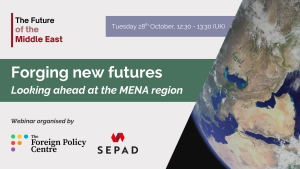Forging New Futures: Looking Ahead at the MENA Region

The Middle East and North Africa (MENA) region is undergoing continuous shifts. The ongoing humanitarian crisis in Gaza has sparked widespread public outrage, as well as regional solidarity across sectarian lines. In Syria, the Assad regime’s collapse in late 2024, after over 50 years of rule, marked a pivotal turning point, reshaping domestic power dynamics and the broader geopolitical calculus. At the same time, the Beijing-mediated Saudi–Iran normalisation eased a rivalry that for years had amplified sectarian divides and fuelled devastating proxy conflicts. Across the region, the general public remains wary of sectarian politics. Mass protests in Iraq and Lebanon, alongside shifting civic identities elsewhere, reflect a demand for accountable governance and new forms of belonging that transcend sectarian labels.
Amid these developments, the SEPAD project explores ‘de-sectarianisation’ as a multifaceted process, ranging from popular rejection of sectarian identity politics (as seen in Iraq’s and Lebanon’s protest movements) to top-down initiatives that re-imagine and re-integrate the relationship between sectarian identities and the state. While sectarian identities remain deeply embedded in political systems, rethinking their role has become an existential challenge requiring action across every level of society.
In this webinar, speakers will examine how the region is navigating this realignment. The discussion will explore shifting alliances and the normalisation of relations beyond traditional sectarian rivalries, the rise of civic movements and youth activism that emphasise citizenship and social cohesion, and ongoing efforts toward reconciliation, accountability, and transitional justice to heal divided societies. Panellists will also consider how governance reform and post-conflict reconstruction can foster inclusive institutions and ensure that rebuilding efforts promote unity rather than entrench past divisions.
Speakers:
– Professor Simon Mabon, Chair in International Politics at Lancaster University and Director of the Sectarianism, Proxies and De-sectarianisation (SEPAD) project
– Dr Nour Abu-Assab, Co-founder and Co-director of the Centre for Transnational Development and Collaboration (CTDC)
– Dr Sanam Vakil, Director of the Middle East and North Africa Programme at Chatham House.
This event is co- organised with the University of Lancaster Sectarianism, Proxies and De-sectarianisation (SEPAD) project as part of our ongoing project to explore ‘The Future of the Middle East’.
The event will take place on Zoom. Registration is required to attend, click here to register.
Zoom – Click here to register.
Professor Simon Mabon, Chair in International Politics at Lancaster University and Director of the Sectarianism, Proxies and De-sectarianisation (SEPAD) project
Dr Nour Abu-Assab, Co-founder and Co-director of the Centre for Transnational Development and Collaboration (CTDC)
Dr Sanam Vakil, Director of the Middle East and North Africa Programme at Chatham House.
